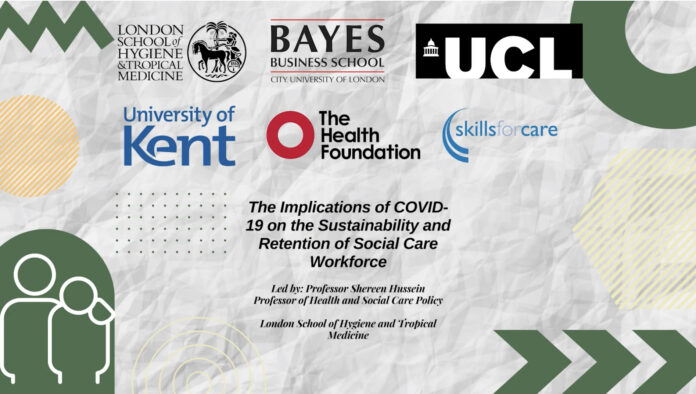A study led by Professor Shereen Hussein has shown that the COVID-19 pandemic has unleashed a wave of unprecedented challenges for the United Kingdom (UK) long-term care (LTC) workforce. Shockingly, government policies primarily centred around safeguarding the National Health Service (NHS), inadvertently overlooking the risks faced by the LTC sector. One distressing consequence of this oversight was the discharge of approximately 25,000 older individuals from hospitals to LTC settings without adequate testing or quarantine measures. Furthermore, the provision of essential personal protective equipment (PPE) for LTC staff could have been much better during the initial months of the pandemic.
Tragically, these oversights led to the rapid transmission of COVID-19 within care settings, resulting in a staggering increase in deaths and excess mortality, disproportionately affecting care homes. In the face of this devastating crisis, the Government’s response was perceived as slow and indecisive, leaving managers grappling with constantly evolving guidance. At the same time, care workers were forced to shoulder responsibilities traditionally performed by registered nurses.
The Retention and Sustainability of Social Care Workforce (RESSCW) study, led by Professor Shereen Hussein and Dr Florin Vadean and funded by the Health Foundation, started in 2019 and concluded in 2023. It aimed to help social care providers, commissioners, regulators, and policymakers understand the specific organisational and individual drivers of staff retention in the social care sector in the United Kingdom (UK). During the course of the RESSCW study, the COVID-19 pandemic has changed our lives, including how social care services are provided and received and significantly impacted everyone involved within the care sector. As a result, the study team supported by the Health Foundation were able to expand on our aims to examine the impact of COVID-19 on workforce retention and sustainability.
The RESSCW COVID-19 study, adopted a mixed-methods approach, starting by reviewing policy documents and media accounts related to the onset of COVID-19 and the social care workforce in the UK, followed by in-depth interviews with employers and providers. Based on the findings of the initial stage, we developed and piloted a short survey to understand care workers’ experience. We ran the first ‘pulse’ survey from July to August 2020 and received nearly 300 responses. We analysed the data and complemented them with interviews with care managers and employers. We summarised the findings from the pulse survey here and the discussions here. Based on the themes identified in the ‘pulse’ survey, we designed and piloted a longitudinal care workers survey with two rounds of data collection, Apr-Jun 2021 (1,037 responses) and Nov 2021- Jan 2022 (754 responses). Some of the findings from the first wave of the longitudinal survey are discussed in this article. The findings from the different strands of work were presented in this video. Figure 1 visually shows the stages of this research.

The COVID-19 pandemic exposed the frailties of the social care sector in the UK, with care workers being left in more vulnerable positions than ever before. This study found that abuse, pay and the well-being of care workers are three essential aspects affected by the pandemic. With about 1,800 care workers during two COVID-19 waves in 2021, our study found that over a quarter had suffered some form of abuse during that period. Verbal abuse was most prominent (20%), followed by bullying (11%) and threats (7%) from individuals using the services, their informal carers and families, co-workers and the public.


“Seeing the results, I think the most worrying thing is how much abuse care workers experience during COVID when they’re doing challenging jobs, sacrificing their health…as a society, we really do have to have a good look at ourselves and discuss why on Earth would we ever attack people who are doing such important work in such difficult times?” Karolina Gerlich, CEO (Care Workers’ Charity)
Despite the high number of abuse incidents among the participants in the study, shockingly, less than half of those who suffered verbal abuse reported their experience to a manager or supervisor, while just over a quarter claimed to have taken no action at all.
“… care managers can be receptive and open to conversation and dialogue with care workers. So when care workers come to them with concerns or to report incidents, certainly listening and actually following through on actions to address the problem, I think, is a big way in which care workers can feel supported and they can feel like their voices are being heard.” Cassandra Simmons, Researcher (European Centre for Social Welfare Policy and Research)
Another alarming finding from the study was that workers from Black, Asian and minority ethnic (BAME) backgrounds and workers from different nationalities suffered a higher proportion of abuse in the workplace. Specifically, almost half (40%) of the BAME participants in the study reported experiencing abuse compared with nearly a quarter (24%) of White British and a third (29%) of Non-British workers.
“[…] have beneficial financial packages and psychosocial attention or services to these workers. So I think one possible action and precisely your project is to improve the quality of life of persons working in long-term care in order for them to feel adjusted, to feel well, to feel part of the system rather than another rather than an adjunct to the system.” Marvin Formosa, Director (UN International Institute on Ageing)
The impact video produced based on the findings of this study highlights the considerable strain the social care workforce has endured due to the COVID-19 pandemic. Various forms of abuse experienced by care workers in 2021 and their differential effects by nationality and ethnicity call for increased support mechanisms to limit such incidents, and care workers’ voices to be heard. The increased demand for staff to work additional hours during such pressured times – for many without additional pay – brings to light continued concerns about the unprecedented working conditions in the sector and stresses that care workers’ wellbeing should be at the forefront of any future agendas.
The heightened workload immensely strained the already burdened LTC workforce, exacerbating existing challenges. Insufficient availability of PPE, staffing shortages intensified by illness-related absences, and a workforce comprising predominantly low-paid and precarious workers culminated in a “perfect storm” of adverse working conditions. During the first wave of the pandemic, care workers’ health and well-being suffered, shedding light on distressing workplace abuse and violence incidents. Regrettably, media reports primarily spotlighted healthcare workers and the NHS, overshadowing the experiences of care workers and their vital role in care homes.
These revelations demand our immediate attention and a concerted effort to effect change. Policymakers, care providers, and society must acknowledge and rectify the systemic flaws perpetuating the LTC workforce’s mistreatment. It is imperative to prioritise the well-being and safety of care workers, address staffing shortages, ensure adequate remuneration, and establish comprehensive support systems.

Moreover, these profound insights serve as a wake-up call to the broader community. We must recognise the immense contributions of care workers and their indispensable role in society, especially during times of crisis. We can forge a path towards a more equitable and resilient future for the LTC sector by raising awareness, fostering empathy, and championing care workers’ rights.
The findings from this study shed light on the profound impact of abuse on the well-being of workers, the organisation they belong to, and the entire sector. The implications are far-reaching and emphasise the urgent need to address these issues. One key finding is the strong correlation between abuse and a poor work-life balance, irrespective of the type of abuse experienced. Our results align with previous research, indicating that a significant number of LTC workers frequently experience feelings of tension, unease, depression, and gloom directly stemming from their job. Consequently, their overall health and work-life balance are detrimentally affected.
Furthermore, our study revealed that workers’ intention to leave the sector was only about half as prevalent as the intention to quit their current employer voluntarily within the following year. This finding highlights the immense motivation among the care workforce to remain in the sector, indicating their hope that a change of employer could lead to improved working conditions. Despite the numerous challenges these workers face before and during the pandemic, their dedication to the sector remains unwavering.
These compelling findings underscore the critical role of policymakers and care providers in ensuring the recruitment and retention of qualified staff. They must prioritise increasing support for workers, offering better compensation, and implementing a robust system that safeguards the well-being of the care workforce. We can foster a more sustainable and resilient care sector by addressing these crucial aspects.
The significance of these results cannot be overstated, and they serve as a clarion call for immediate action. Stakeholders must engage in meaningful discussions to shape future policies and practices, strongly focusing on protecting and empowering the care workforce. Through such concerted efforts, we can build a future where caregivers receive the support they deserve while providing exceptional care to those in need.
The study team:
This project is part of the Retention and Sustainability of Social Care Workforce (RESSCW) study funded by the Health Foundation (Efficiency Research Programme): 2019-2022. Project Team: S. Hussein & F. Vadean (Co-PIs), S. Allan, E. Saloniki, K. Gousia, A. Turnpenny, G. Collins, A.-M. Towers, A. Bryson, J. Forth, C. Marchand, D. Roland and H. Teo
Disclaimer: The Health Foundation is an independent charity committed to bringing about better health and health care for people in the UK. The views expressed are entirely those of the authors.




